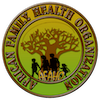 How long has AFAHO been around?
How long has AFAHO been around?
AFAHO was founded 14 years ago in 2005 when I was working for the city of Philadelphia as an African and Haitian Health Care Coordinator focusing on HIV/AIDS care. In the early 2000s, Alicia Beatty, Deputy Director of the Family Planning Council gave me a research grant to do a needs assessment on African childbearing with a University of Pennsylvania anthropologist. With the help of Mr. Alfonso Kawah, Akana and Dr. Ken Simbede (Researcher at Temple University), we (AFAHO) received our 501(c3) and began work as a nonprofit to reach more people. We are thankful to Alicia Beatty, Linda Robb, and John Cella who helped AFAHO to get started.
What were the early days of AFAHO like?
The early days were challenging. Most of AFAHO’s employees started out as clients and were trained to deliver quality outreach services in the community. In the early days, I also began to realize that there was a need to empower the staff so that AFAHO can serve the younger generation. As a result, I stepped down after 10 years knowing that it was important for AFAHO to have new young leadership as well as more voices at the table. I am honestly grateful to the new leadership at AFAHO for keeping the fuel going. Oni Richards is a phenomenal Executive Director who has really taken the organization to greater heights. We have seen an increase in the number of programs, younger people coming on board, greater employee satisfaction and greater visibility.
What makes AFAHO unique?
AFAHO is truly innovative in its approach. We are there to help people with the issues that they have – whether it is seeing a doctor, not working, and not knowing how to read and write. AFAHO addresses the entire issues at hand – one stop shop. We are unique in our ability to transform the human condition of our community members. We are truly a family and see our clients as part of an extended family.
What is AFAHO’s competitive advantage?
The connection that we have with our clients is remarkable. They are comfortable talking to us and confiding things in us that they might not even tell their families. There is a true level of confidentiality that we maintain with our clients and it all stems from trust. This trust is the cornerstone of our work as it enables us to address the real and often unseen needs of our clients. AFAHO is very thoughtful in the kinds of partnerships we develop, making sure that these partnerships will benefit our community and not take advantage of them.
For funders, what makes AFAHO worthwhile?
AFAHO is unique in the sense that it was founded by an African immigrant who came into the USA with no English. To know that we can make a difference in helping others in need is really profound. Although our name says African, we are helping everyone in the community as many of our clients come from the Caribbean and we have helped some of our African American neighbors as well. We are worth the investment because we are there for those in need. In addition, we have a professional and personal connection to our work. Financial resources that we get go into the community and their needs are put first before any other thing. We are truly collaborative and we are propelled by our need to serve rather than other ulterior motives.
What barriers does AFAHO face?
Finding a good location in the City of Philadelphia has been tough. It has been a challenge to us because with a growing community comes the need for a bigger space. Politics play a huge role in our ability to have a location especially when there are different urban development plans going on. It is my dream that when we have a solid location, AFAHO would be truly innovative in our ability to not only provide health services but essential human services in the 21st century.
Limited funding has also been a challenge especially since we do not play a numbers game when asking for funds. Most donors do not know how unique we are in our approach, so we really welcome everyone to visit or get involved to see firsthand. We are really plugged in the community and we find it important to be who we say we are in reality, rather than claiming to who we are not.
What is your vision of AFAHO?
A bigger community space, wider outreach to more people in the Greater Philadelphia region (maybe even Delaware Valley). At some point, it would be great for the organization to help the motherland (Africa) in some capacity. This is because as immigrants, we value the need to give back. And it would be great for AFAHO to be in a place, whereby we can help those back home.
How does someone get involved with AFAHO?
Give us a call, reach out, and definitely share our information with others – whether its church, synagogue, mosque, family, friends, etc. Donate and get involved!

